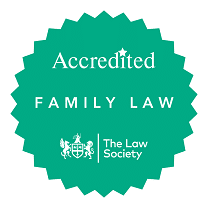Do you need advice from an Accredited Family Law Solicitor in Chester?
We know that divorce is a difficult and emotional experience and the importance of getting the right divorce solicitor during divorce proceedings cannot be over-emphasised.
Our family law solicitors will ensure that our clients are certain that this is what they want and we spend time with them considering and advising upon their options.
So, if you need a family law solicitor, why not book a free, no-obligation initial consultation today with the family law experts at Freeman Jones Solicitors and find out how we can help you in your time of need?
We are Accredited Family Law Solicitors as recongised by The Law Society

Contact Colin Freeman first on 01244 506 444 or fill in our enquiry form.
Hear what our clients have to say about our family law solicitors

Family Law Solicitors Chester: What to consider
We understand that many disagreements and issues can arise during a divorce. Common examples are money disputes, child care arrangements, maintenance provisions, pension sharing and sharing/selling your home.
So if you need a solicitor for family law, Freeman Jones Solicitors can provide specialist legal advice to help guide you through either the divorce process or any other family law issues.
There are many things to consider when starting divorce proceedings and so it is important to understand the process. You will also need to deal with the financial side of the divorce, which involves dividing the assets and liabilities of the marriage. In many cases the children are also of paramount importance. These areas of family law can be complex but are almost unavoidable during divorce proceedings.
As leading family lawyers in Chester, we have specialist divorce solicitors that can provide expert legal advice for all these issues. Although it is true that divorce and children do not combine well, a non-confrontational and constructive approach to divorce cases reduces the impact on children, and is often the best and cheapest way of resolving the issues between the parties. We also have experience and can help with any issues of domestic abuse and violence.
Where possible, we try and encourage out of court solutions and will give you the advice to enable this to happen.
However, rest assured, our experienced and personable team of family law solicitors will fight for your share of the marriage assets, whether your personal situation is relatively simple or highly complex involving substantial property, pensions, and business interests.
FAQ’s About Family Solicitors and Divorce
We recognise that the separation process flags up a lot of questions as you try to come to terms with what has happened and navigate through various issues that arise from the breakdown of your relationship.
This can be especially difficult where you and your spouse cannot agree on how finances are to be divided, what the arrangements should be for your children and how to deal with shared assets, pensions, and the family home.
Advice from an experienced separation family solicitor can be invaluable in both protecting yourself and achieving a fair settlement allowing you to move on with the next chapter of your life.
We now breakup the various elements of family law and separation and answer some of the common questions raised.

Family Law FAQ’s
-
A family solicitor advises on divorce, finances, childcare, domestic abuse, cohabitation, name changes, wills, guardianship—guiding you through the legal process and your rights
-
Family law is complex and ever-changing. A solicitor ensures you’re up to date with the law, follow the correct process, and aim for a fair result.
-
Look for strong reputations and good reviews. Consider independent recommendations—or choose experienced, accredited local solicitors like Mr Colin Freeman in Chester.
-
Look for someone with experience in family and divorce law, good client reviews, clear communication, and a specialist accreditation (e.g., Law Society Family Law Accreditation). It’s important you feel understood and supported, and that the solicitor knows how to handle your situation.
-
Costs depend on case complexity and whether matters are disputed. Freeman Jones Solicitor offers fixed-fee packages and private billing, and provides detailed cost estimates upfront for clarity .
-
Be prepared to explain your situation, concerns, goals, and priorities. Ask questions about their experience, the timeframe, what costs to expect, and steps you might take to manage your case efficiently.
-
If your marriage has broken down and you meet legal conditions, yes—you can file for divorce. Freeman Jones offers guided support through the full process
-
You don’t legally have to, but it’s strongly recommended. A solicitor helps ensure you complete forms correctly, navigate proceedings, and get fair financial and child arrangements .
-
You start by filing a divorce petition. Your solicitor helps prepare and submit the paperwork to the court, guide communication with your spouse, and work on settlement (finances, property, children)
-
Timescales vary, but the process involves several stages (petition, answer, decree nisi, decree absolute). A solicitor will explain typical timescales based on your circumstances.
-
Costs depend on complexity and whether disputes go to court or are resolved amicably. Solicitors like Freeman Jones offer transparent pricing, cost estimates, and fixed fees for some services
-
There are generally five stages to the divorce process:
-
File a divorce petition
-
Serve a petition on your spouse
-
Respondent files response
-
The court may grant a decree nisi
-
After the waiting period, the decree absolute finalises divorce .
Take a look at our Divorce Process Flowchart for a more visual overview.
-
-
Very similar to divorce. The same legal process, paperwork, and financial/child matter considerations apply .
-
The formal legal document filed to start divorce proceedings. It states your details and confirms your marriage has irretrievably broken down
-
Grounds must meet legal criteria—such as separation, unreasonable behaviour, or adultery—and are explained by your solicitor when filing the petition.
-
Yes, you can get a divorce without arranging a financial settlement or obtaining a financial order. However, without this court-approved document, either party can make future financial claims, even years later
-
A legal order ending all future financial claims between spouses. It provides certainty and a separation of finances once granted.
-
The house and property will be assessed as part of the financial settlement. Options include selling, one party buying out the other, or keeping it jointly, depending on what’s fair.
-
The court considers fairness and all relevant factors: contributions during the marriage, future needs, children’s welfare, length of marriage, assets, income, and pensions.
-
Legal aid is not available for routine divorces. However, legal aid may be granted in serious situations—e.g. domestic violence, child abduction, homelessness risk—and if you cannot afford legal fees. Even if legal aid doesn’t apply, you may qualify for reduced court fees if you have low income or savings.
-
A Mesher order (also called a “deferred sale” order) postpones the sale of the family home for a set time or until a specific event (like a child reaching 18). It keeps the property in both names, with a charge for the non-occupying partner. It’s often used to maintain stability for children.
Common misconceptions about divorce
There are also many popular misconceptions about divorce proceedings.
Here are some of the most common ones:
-
This is untrue, you and your partner must have been married for a year or more to start divorce proceedings. However, if you believe that your marriage should never have been a legal marriage, the court can ‘annul’ it, meaning that legally, the marriage never happened.
-
This is incorrect as many clients want an amicable divorce and manage to achieve this. Defended divorces are relatively infrequent.
-
This is untrue. Unless you and your partner have lived apart for over two years, all divorce settlements have to be based on either unreasonable behaviour or adultery, the most common being unreasonable behaviour.
-
This is incorrect, if one party begins a physical relationship with another person before the decree absolute has been pronounced, they are committing adultery.
-
Although this is the most common agreement, this is not always the case. If both parents have an equal position in caring for the children, then no presumption would be made in favour of the mother of the children.
-
There isn’t a common law spouse, no automatic rights are acquired when an un-married couple are cohabitating.
-
A financial order is a court‑approved, legally binding document detailing how assets, property, pensions, savings, and ongoing obligations (like spousal maintenance) are shared after divorce. It can be a mutual agreement (consent order) or a court‑decided one. Freeman Jones Solicitors strongly advises every divorcing couple to obtain one to secure clarity and legal protection
-
Yes. A financial order is separate from divorce. You can finalise your marriage and arrange finances independently. However, having a financial order gives legal confidence that no future financial claims can be made by either party.
Related Family law articles




Book Your Free, No-Obligation 20-Minute Consultation Today!
"*" indicates required fields

